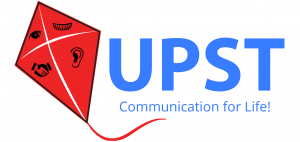Helpful Information
Easily navigate to:

Geriatric and Adult Program

Geriatric and Adult Program: As we understand the needs for services for the adult/geriatric population, Upstate has expanded to include an adult division: GAP (our Geriatric and Adult Program). Please contact us if you are interested in pursuing an evaluation and/or therapy.
Printable Developmental Checklists

Directions print out this and check each option that applies:
1. Articulation
Check the section if your child does not demonstrate a particular skill at a given developmental age.
Referral to a Speech-Language Pathologist is Necessary When.
___ By AGE 3, cannot be understood by family and/or caregivers
___ Does not correctly produce vowels and such sounds as p, b, m, w in words
___ Becomes frustrated when asked to repeat when not understood
___ By AGE 4, Cannot be understood by individuals with whom they do not associate on a regular basis
___ Cannot correctly produce t, d, k, g, f
___ Cannot repeat without becoming sensitive
___ By AGE 5, Cannot be understood in all situations by most listeners
___ Does not correctly produce most speech sounds, including l, v, sh, ch, j
___ By 6-1/2 to 7 years, speech sounds are not like an adult
___ Incorrect production of any sound, including r, s, z, th
The above items can be used as a basic screening tool to determine if your child needs services. This checklist can be brought to the evaluation as part of the case history intake information. If you checked any items it your childs category, it is necessary that your child be seen by a speech-language pathologist. Please contact the uPs Therapy office to schedule an evaluation at (864) 438-0990. Insurance is accepted for most companies.
2. Language
Request an initial consultation with any of the following:
By Age 1:
___ Does not respond to music and/or singing
___ Cannot understand simple questions
___ Does not look at familiar people when named
___ Does not maintain eye contact, attention to speaker
___ Little interest in social interaction, language, or pointing
___ Does not say mama or dada
___ Does not begin to imitate words
___ Does not say 1-2 words imitatively
By Age 2:
___Cannot identify basic body parts
___Cannot understand simple commands, like give me without gestures
___ Does not demonstrate action words (i.e., eat)
___ Does not speak using 1-2 words at a time
___ Does not use new words frequently, at least 50 words
By Age 2.5:
___ Does not use short sentences
___ Does not respond to hello and bye consistently
By Age 3:
___ Does not relate experiences verbally
___ Does not state first/last name
By Age 4:
___ Does not use short but grammatically correct sentences
___ Does not understand comparisons or make basic inferences
By Age 5:
___ Does not use complex sentences
___ Does not explain how to do something
___ Does not respond to why questions with a reason
___ Does not understand complex directions
___ Does not understand concepts
School-Aged Receptive Language:
___Exhibits difficulties understanding teachers instructions and/or following directions
___ Exhibits difficulties in reading comprehension across subjects
___ Exhibits difficulties in mathematical reasoning, learning numbers, and/or concepts and applications
School-Aged Expressive Language:
___Difficulties in oral and/or written expression including appropriate
use of words, grammar, and underlying meaning
___ Difficulties in basic reading skills, including the ability to decode letters and words and attain information
___ Difficulty interpreting and applying abstract written information
**Children develop at different rates. Please allow for variance, (+ or – 6 months) for receptive and/or expressive language to develop.
Forms
Language

Referral for a Language Disorder
Directions:
Review each item if your child does not demonstrate a particular skill at a given developmental age, then print out this and check each option that applies:
Referral to a Speech-Language Pathologist is necessary when:
___ By AGE 1, Does not respond to music and/or singing
___ Cannot understand simple questions
___ Does not look at familiar people when named
___ Does not maintain eye contact, attention to speaker
___ Little interest in social interaction, language, or pointing
___ Does not say mama or dada
___ Does not begin to imitate words
___ Does not say 1-2 words imitatively
___ By AGE 2, cannot identify basic body parts
___ Cannot understand simple commands, like give me without gestures
___ Does not demonstrate action words (i.e., eat)
___ Does not speak using 1-2 words at a time
___ Does not use new words frequently, at least 50 words
___ By 2-1/2, Does not use short sentences
___ Does not respond to hello and bye consistently
___ By AGE 3, Does not relate experiences verbally
___ Does not state first/last name
___ By AGE 4, does not use short but grammatically correct sentences
___ Does not understand comparisons or make basic inferences
___ By AGE 5, does not use complex sentences
___ Does not explain how to do something
___ Does not respond to why questions with a reason
___ Does not understand complex directions
___ Does not understand concepts
___ School-Age Receptive Language – Exhibits difficulties understanding teachers instructions and/or following directions
___ Exhibits difficulties in reading comprehension across subjects
___ Exhibits difficulties in mathematical reasoning, learning numbers, and/or concepts and applications
___ School-Age Expressive Language – Difficulties in oral and/or written expression including appropriate
use of words, grammar, and underlying meaning
___ Difficulties in basic reading skills, including the ability to decode letters and words and attain information
___ Difficulty interpreting and applying abstract written information
The above items can be used as a basic screening tool to determine if your child needs services. This checklist can be brought to the evaluation as part of the case history intake information. If you checked several items in your childs category or if there are gaps in development, please contact the uPs Therapy office to schedule an evaluation at (864) 438.0990. Insurance is accepted for most companies.
Related concerns

Referral for School-Age Related Concerns
Directions:
Print out this and check the section if your child exhibits a particular symptom or deficit.Referral to a Speech-Language Pathologist is Necessary When.
___ School-Age Related Concerns – Obvious sound repetition and/or prolongations of speech, with or without observable signs of tension
___ Consistently harsh, hoarse voice or change in vocal behavior
___ Social communication is impaired
___ Disorganized, limited problem-solving and judgment, poor concentration and attention, especially for sustained periods of time
Contact uPs Therapy Services for an evaluation at (864) 438-0990.
Resources

- American-Speech-Language-Hearing-Association (www.asha.org) is the professional, scientific and credentialing association for more than 120,000 members who are audiologists, speech-language pathologists, and speech, language, and hearing scientists.
- Autism Society of America (www.autism-society.org) is a national grassroots organization dedicated to promoting advocacy, education, support, services, and research for individuals on the autism spectrum. A wealth of articles on educational approaches appropriate to addressing executive skill weakness in autism is prevalent.
- Brain Connection (www.brainconnection.brainhq.com) provides a variety of articles and resources for parents and professionals about brain development and new brain research, particularly how these relate to childrens learning.
- CHADD (www.chadd.org) is an organization dedicated to providing advocacy, education, and support for individuals with ADHD. The website if an excellent source of information for individuals, parents, and professionals about topics related to ADHD.
- Council for Exceptional Children (www.cec.sped.org) is an international, professional organization whose mission is to improve educational outcomes for students with disabilities, individuals with exceptionalities, and/or the gifted.
- Integrated Listening Systems (www.integratedlistening.com) is the organization responsible for the training of the listening practitioners as well as the implementation of the equipment. More specific information about the programs and research about the programs and varying disabling conditions are presented.
- Learning Disabilities Association of America (www.ldanatl.org) is an organization dedicated to promoting an understanding of learning disabilities, creating success for individuals with learning disabilities, and reducing the incidence of these disabilities in the future. This is comprehensive site for information about all aspects of learning disabilities.
- National Coalition for Auditory Processing Disorder (www.ncapd.org) is an organization founded by Dr. Jay Lucker to educate about APD and give families resources about the disability.
- Wrightslaw (www.wrightslaw.com) contains articles focusing on special education law and advocacy for children with disabilities.
- Zero to three (www.zerotothree.org) provides informative information on an array of topics (brain development, nutrition, child rearing) for adults who influence the lives of infants and toddlers.


